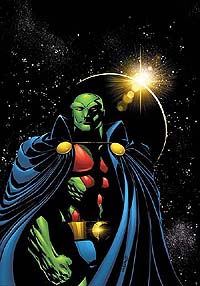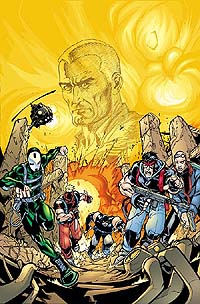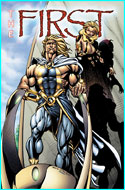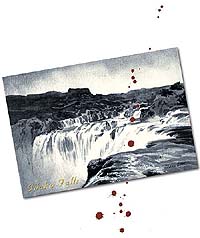|
Each week we take a critical look at some of the best books on the stands, courtesy of Big Guy's Comics (the unofficial comic book store of FanboyPlanet.com) and Brian's Books (the other unofficial comic book store of FanboyPlanet.com). If you publish a book that you want us to be covering, contact us. Or contact Derek. He doesn't have enough to do.
Hey Kids! Comics!
Bone #44
untitled
story and art by Jeff SmithJust as things had gotten grim for the Bones, Smith reminds us what a creative and charming story this all is. Oh, the grim parts still exist, but the fantasy elements have a renewed sense of fun. And for those of us who may have missed it, Phony and Smiley get a lot of focus as they try to sneak their pet rat creature into the city of survivors.
This book is nearing its final showdown between good and evil. If you are not onboard, go over to our trade paperback site and order at least the first book to catch up. This one hooks even non-comics readers.
Liberty Meadows #22
The Evil Brandy Saga
story and art by Frank ChoYes, this makes two "cute, funny" books in a row this week, but both are worth your attention. For those just jumping on, Liberty Meadows is actually a daily comic strip chronicling the lives of a group of dysfunctional animals at an animal sanctuary. Their human caretakers are only slightly more well-adjusted.
Due to a problem with the syndicate, Cho's strips got help up being reprinted in book form, so he chose to launch a monthly comic book both reprinting and restoring censored strips. Normally the strip covers gags reminiscent of Tex Avery cartoons, but this issue provides a good launching point by being one long storyline.
An alternate dimension version of Brandy, the strip's heroine, has come to our Earth to kill the one man she considers a threat, and also to provide Cho the opportunity to draw twice as much cheesecake. It's hilarious, pulse-pounding, and features the hideous Pokemonkey. Buy it.
Martian Manhunter #36
Traps
writer: John Ostrander, artists: Jamal Igle and Ray KryssingAs the book reaches its conclusion, it gets good again. Argh.
Seemingly opening as a recap of past adventures, it turns out that the past few issues may have been a forced re-living, as part of a psychic battle J'onn has been having with one of his oldest living Earth enemies, Dr. Trapps.
Trapps faced J'onn when he fought alongside the now dead Justice Experience, a group retconned into existence to cover the DCU sixties and seventies. For the first time, Ostrander sets up actual arch-enemies for J'onn, and it's too little, too late. The story does suffer from a cop-out at the end, wrapping up a long-standing subplot too patly.
The series cannot be saved, but you can savor this one as a "what should have been," and realize why J'onn is a cool member of the JLA.
Origin #1
The Hill
writer: Paul Jenkins, artists: Andy Kubert and Richard IsanoveThe story many believe should not be told is finally here. Jenkins, with help from Marvel execs Bill Jemas and Joe Quesada, ends up spinning a tale of class boundaries, with a little of The Secret Garden thrown in. Despite knowing that somehow this will all end up being about Wolverine, right now it feels like a Victorian novella, with not a single drop of adamantium in sight.
Isanove's computer inking really lets Kubert's fine penciling come through. Rich in detail and expression, the only mis-step lies in making one character look way too much like the modern-day Logan. If part of the mystery of this series lies in whether the father or the son of the Logan family becomes Wolverine, the design may prove too red a herring.
Speaking of red, the beautiful young protagonist, Rose, also looks suspiciously like a young Jean Grey. Are we now to believe that Wolverine's attraction for her has an edge of fate to it? Time will tell.
Even the skeptics should give this book a shot. Jenkins almost never fails as a writer, and as Jemas has pointed out, if Marvel does not do the origin, the movies will. At least these guys really care.
Suicide Squad #1
Almost A Good Idea
writer: Keith Giffen, artists: Paco Medina and Joe SanchezGiffen tends to write books in which we have to play catch-up from the very beginning. Suicide Squad does not vary from this trend, although readers of the previous series stand a pretty good chance of figuring it out. For the rest, this book may jump around too much.
Detailing the first mission of the revived Squad (with no more of a survival rate than the X-Force has had these last couple of months), the book jumps around in time. Major Disaster, apparently de-powered from his deal with Neron, leads the rest of what was once Justice League Antarctica (no, really) on a rescue mission that quickly turns deadly. But we jump around a lot of different narratives, meant to be unsure as to who is telling us what. It all ends up as an excuse to kill off a lot of lame characters, with Giffen's usual twisted mix of humor and pathos.
The approach leaves me a little cold, though I love the basic concept. Medina and Sanchez do a riff on Ed McGuinnes, except that almost everyone looks alike. And already, yet another casualty of Our Worlds At War pops up alive. Doggonit, they could not even wait two weeks.
Right now, consider this book on probation.
Superman #174
Every Blade Of Grass
writer: Jeph Loeb, guest artist: Steve LieberEverything that Loeb has been trying to do stylistically the last couple of month finally pays off. The "speech" he appropriates for narration comes from Martha Kent's journal, so Loeb can fit the beats together.
Lois and Clark rebuild the Kent farm (well, Clark rebuilds it, Lois just stands around looking concerned), while they wait for news of the elder Kents. The story focuses on the man behind the super, and after the huge cross-over, it makes for a good breather. As in the recent Rising Stars, let's just say "selah."
Guest artist Lieber also helps change the speed. As much as regular penciler Ed McGuinnes' art has been electrifying to fandom, it looks good to see everyone drawn in realistic proportions again. A quieter tale needs this quieter approach.
For Superman fans, this will be a favorite story. For those who don't like superheroics, this might be an issue to try and understand why some of us do.
The First #11
Frequency Rating: Good Read (6/10)
Writer: Barbara Kesel. Artist: Bart Sears. Inker: Andy Smith.
Reviewed by: Daryl Tay from Unique FrequencySummary of events:
We see how the pieces of the puzzle are coming together. The Seahn/Ingra/Braag formation has a possible opposition, that of the meeting of Persha and Pyrem. We find that Seahn is trying to rally more troops to him under Enson's subtle encouragement and we're given interesting hints about Wyture and Enson's true nature, and what they are doing with the First. Gannish also stumbles upon a world, Earth, setting of Crux, from which he discovers the First were born from, but do not live on.Initial Thoughts:
The First has been one of the more complicated Crossgen books to follow, basically because of the many characters that are introduced as well as the rather tough to remember names. However, after 11 issues the story is beginning to clear. Persha and Pyrem working to unify House Sinister and House Dexter, while Seahn and Ingra are trying to prevent it.The Good:
I like the interesting choice of the alliances. The child of House Sinister with the adult of House Dexter and vice versa. And how the Persha is the opposite of Ingra, as well as Seahn and Pyrem. The art here is a rather suited to the book, Bart Sears make all the members of the First Godlike in sppearance, and colourist Michael Atiyeh does a good job with creating vibrant colours to portray the members of the First. Andrea DiVito is coming on soon to take over the chores of Bart Sears, but I think his art style would be rather suited to the book as well.The Bad:
I can't stand the constant crossovers with the First and the other books. Granted, the first issue crossover with 'The Path' was to set the stage, but since then, Ilhan of Meridian and now the Crux cast are going to appear in the book. Rather contradicting to Crossgen's claim that readers don't have to read the books all together don't you think? Besides Gannish and Enson, most of the First all look similar in appearance and not much is done to really distinguish them from the rest, which really has always been my big problem with the book. Wytre, Ingra, Persha and even Yala have no distint, separate identities and even the same goes for Braag, Pyrem, Seahn and Trenin.In Conclusion:
Perhaps the First would be a good book to pick up in TPB form, since it really is hard to follow both who's who, as well as what the story is only once a month. While the First remains as my least favourite Crossgen book at the moment, I'm still interested in seeing the way everything is going to click together, and how all the members of the First tie in to this.Mystic #16
Untitled
writer: Ron Marz, artists: Brandon Peterson and John Dell
Reviewed by CharlieWentlingThis is a fun, self-contained issue where Giselle and Genevieve battle a seemingly unstoppable golem. People who feel that Crossgen books are all talk and not enough action should check this one out. The humor and romance only add to its charm.
The art is good, but there are a few too many splash pages that tend to disrupt the story's flow. A six page backup story, continued from the previous issue, focuses on Genevieve. Nothing out of the ordinary, but then again it is six extra pages without any increase in price so how can you complain?
If you are curious about Mystic, this would be a good issue to pick up.
The First #11
Untitled
writer: Barbara Kesel, artists: Bart Sears and Andy Smith
Reviewed by CharlieWentlingThe First is consistently the best-looking book that Crossgen puts outs, thanks to the penciling of Bart Sears. At the same time it is probably the hardest title for the casual reader to follow. There is a continuing story that is always evolving, and a large cast of characters. But it is worth the effort.
This issue focuses mainly on Persha's first meeting with Pyrem, and gives plenty of foreshadowing for who will lead both Houses after the coming civil war. It would be easy to say that House Sinister are the bad guys and House Dexter the good guys, but things are not as two-dimensional as that. Most of the characters fall somewhere in the middle.
This series is the glue that ties the Crossgen universe together. Stick with it for a few months and you will be hooked.
The Adventures of Barry Ween #4 (of 6)
Monkey Tales
story and art by Judd Winick
Reviewed by Michael GoodsonBarry Ween issues are few and far between, but they are usually worth the wait. This month is no exception as we get to see how the relationship between Barry and Jeremy first started.
If you've read Barry Ween before then this is more of the same (in a good way). If you've never read Barry Ween before then this is as good of place to start as any. Each issue follows the adventures of the foul-mouthed, boy genius Barry Ween and his dim witted friend Jeremy Ramirez.
Judd Winick brings the same knack for story telling to Barry as he does to Green Lantern. If you enjoy South Park, then The Adventures of Barry Ween is right up your alley.
Batgirl #20
Spoiled
Guest Writer Chuck Dixon, artists Damion Scott, Robert Campanella, Jason Wright
Reviewed by Michael GoodsonThis month we get to see Spoiler in action as a member of the "Gotham Posse." I was really looking forward to this issue since we haven't really had a chance to see Spoiler since she began training with Batman. Who is she? Why does she get to train with Batman in the Batcave? What's up with that lame costume? Unfortunately none of these questions are answered. This issue is really more of a team up book as Spoiler forces herself on a Batgirl mission.
The story is nothing new and there wasn't any real character development. While I usually enjoy Batgirl, this issue left me flat. Pass on it, if you can.
Alias #1
untitled
writer: Brian Michael Bendis, artists: Michael Gaydos
Reviewed by Michael GoodsonYears from now when people are talking about the Marvel "Adult Comics" line MAX, an interesting bit of trivia will be "what was the first printed word in the first issue of the MAX line?" The answer starts with F and rhymes with duck. My favorite writer Brian Michael Bendis kicks off Alias with an enjoyable issue.
Alias follows the life of former superhero, Jessica Jones. Since "out growing" the superhero lifestyle, Jessica has opened her own private detective agency, become an alcoholic and picks up men in bars for one night stands. I can't imagine why it says "Parental Advisory, Explicit Content" on the front. That's not actually sarcasm. Take out the swearing and the completely pointless sex scene with Luke Cage and there really isn't a ground breaking story that needed to be told so badly that it required Marvel to start its own line of adult comics.
On the upside, the story is enjoyable and it ends with a nice cliff hanger that will definitely make me buy issue #2. The art is dark and rough, but it fits the flavor of the story. Go out and buy it today.
Daredevil #23
Making Offers
writer: Bob Gale, artists: Dave Ross and Mark PenningtonWe've switched artists this week, and it takes a little getting used to. The Ross and Pennington team draw a little more simply and cleanly than Phil Winslade, taking the book to earlier, lighter days. And as this story arc nears its conclusion, that makes sense. Gale resurrects an old, very obscure archenemy as the mastermind behind this whole plot (and if anyone actually figured it out ahead of time, buy yourself an ice cream cone. You deserve it.). Yeah, old Hornhead has a lot of lame enemies.
Still, after all the hell that Matt Murdock has been put through in his Marvel Knights incarnation, it's a relief to see Daredevil be a confident man who knows that eventually good triumphs over evil, especially lame evil.
Daredevil: Yellow #4
Never Lead With Your Left
writer: Jeph Loeb, artist: Tim SaleForget reader identification with the blind Matt Murdock; we all have a touch of Foggy Nelson. That being said, reading about Matt is more fun.
Loeb and Sale continue getting to the heart of what makes a hero a hero. Matt has avenged his father's death, and finds himself not nearly as satisfied as he had hoped. With his ghosts put to rest, he still carries the Daredevil uniform with him, without knowing why.
Clearly, we're on the road to figuring that out with Matt. And since it's all framed with Loeb's current favorite device of narrative letters, the simplicity of the action we see has a bittersweet touch of tragedy. How did Karen Page go from being the girl you bring home to meet your mama to being hot mama crack whore pornstar?
We'll save that one for Daredevil: The E! True Hollywood Story.
Exiles #4
Old Wounds, New Battles, part two
writer: Judd Winick, artists: Mike McKone and CannonFor those who do not remember the Dark Phoenix Saga, this will still seem like a rocking X-story. For those who do remember it, Winick serves the memory well.
The Exiles have been mysteriously handed the task of righting the possible wrongs in other continuities. (So far this basically means making sure that the X-Men do as close to what they actually did in the Marvel Universe.) In some ways, it's a very clever way of reviving What If? without actually doing it.
Winick tells the story with great sensitivity, especially as Nocturne has to take out her own father, Nightcrawler, in the battle to kill the Dark Phoenix. McKone and Cannon draw some great fight scenes, with due homage to the Byrne/Austin original.
The premise may play itself out sooner than later, but for now, this book has our attention.
Green Lantern #142
House On Fire, Part Two
writer: Judd Winick, artists: Eric Battle, Rich Faber, and John LoweKyle suffers from third-degree burns while Jen fights against a group of fire-powered villains. Just to make this month complete for Hal Jordan, The Spectre makes a quick appearance, in order to foreshadow something big coming.
Just once I'd like to see a hero acknowledge that this happens to them every other month.
Anyway, Kyle has trouble healing himself because he's "…trying too hard." This from Hal Jordan, who mostly used the ring to make giant fists. Yeah, he knows all about trying too hard. Once the mystery of this issue's villains gets solved (and it may be forehead-smackingly obvious), Winick dips into Hypertime and gives us a huge continuity error. Or maybe I missed an issue. If anyone can explain the reference to Jen's family in the last couple of pages, please e-mail me.
The art doesn't help. Characters appear lumpy, and have varying proportions from panel to panel. And for a book about people who essentially have light-based powers, it sure is dark.
Kyle and company have a lot of potential, but somehow, Winick's successful attempt to provide youthful realism becomes less and less interesting with each issue.
Legends Of The Dark Knight #147
Bad, Part Two
writer: Doug Moench, artist: Barry KitsonOkay, on this whole Batman's psyche thing: DECIDE, ALREADY! As anyone could have predicted, this tale of Batman facing off against a dangerous split personality and using a psychologist to help is really just an excuse to explore the split between Bruce Wayne and Batman. Devin Grayson has been doing just that to varying effect (and far more subtly) in Gotham Knights.
Yes, stories in this book do tend to explore a younger, less sure Batman, but when the regular books keep going over this territory, at least bring something new to the party. Moench does not even help himself by writing dialogue anything less than leaden and portentious.
Kitson, while not one of my favorites, has a distinctive style that works well, and luckily gets his best inker here, himself. A few panels have a nice experimental feel that almost make up for the hackneyed story.
We have seen this situation for Batman over and over and over. Only the villains change.
Ultimate Spider-Man #13
Confessions
writer: Brian Michael Bendis, artists: Mark Bagley and Art ThibertSpider-Man, Ultimate or otherwise, does not make an appearance this issue. Instead, Bendis focuses on Peter and Mary Jane's relationship, in a great change-of-pace quiet little story.
The two teens sit in Peter's bedroom as he admits to Mary Jane that he is Spider-Man. It makes perfect sense. Of course a teen-age boy would share the secret with someone, and of course we know that eventually these two must get together. Sorry, but Sony hath decreed it for next May 3.
Bendis handles it with his usual sharply real dialogue, and reminds us that this Aunt May is far more on top of things than in her previous incarnation. The artists do a great job of giving us a believable teen-aged boy with an unbelievable secret. Not an emotional moment gets lost.
Jump on here if you have not. Give it to a teen-ager.
Wildcats #27
Idaho Falls
writer: Joe Casey, artist: Sean PhillipsIt's all moving towards an inexplicable re-launch as a "Mature Readers" title. Again I say, it already is such. But anyway, Casey and Phillips begin wrapping things up in anticipation, and set the stage for a new status quo.
They do need to clean things up next issue. A lot of what has been going on in this book does spin on continuity from Jim Lee's original vision, WildC.A.T.S. Zealot may mean next to nothing to you, but her storyline is coming to a close anyway.
This issue seems to be more marking time than anything else, though it does prove that Grifter has the biggest cajones in all of comics.

All comics were reviewed by Derek McCaw unless otherwise noted.
















